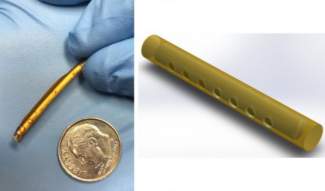I know there are many days I forget to brush my teeth at night or forget to take my flax seed. For those of us that misplace our keys, our debit card, our head if it wasn't screwed on, there may be a new way to conveniently battle the spread of HIV. Yes, our health is much more important than temporarily misplacing a credit card, but the lack of adherence is the cause of many of our individual and community's health woes.
Medical practitioners and scientists acknowledge that one of the main drawbacks in current medical treatments is the problem of adherence. "It's unfortunate, but patients do not always follow the dosing instructions as prescribed," says Dr. Baum. "In clinical trials erratic administration of drugs has led to highly variable efficacy outcomes. That's what peaked our interest in the possible use of a subdermal implant for the prevention of HIV," suggests Dr. Baum. – www.sciencedaily.com
To combat the issue of adherence, scientists at The Oak Crest Institute of Science turned to a practice that started in 1993 when a new way to administer birth control to women was introduced. The science aimed at population control was actually around in 1966 (made possible by the discovery of silicone), licensed outside of the US in 1983. It was finally approved for US usage in 1993 with 6 rods, down to 2 rods in 1996, and then 1 rod in 1998 (arhp.org). Of course, when it came out, my thoughts were, "why are women doing this? Just take a pill." Now that the shoe is on the other foot, the implant is becoming an interesting option.
A novel, subdermal implant delivering potent antiretroviral drugs shows extreme promise in stopping the spread of HIV, researchers report. Scientists say that they have developed a matchstick size implant, similar to a contraceptive implant, that successfully delivers a controlled, sustained release of ARV drugs up to 40 days in dogs with no adverse side effects. – www.sciencedaily.com
The novel, subdermal implant, developed by scientists from the Oak Crest Institute of Science, provides sustained release of potent antiretroviral drugs which are showing extreme promise in preventing sexually transmitted HIV when used as pre-exposure prophylaxis. – www.sciencedaily.com
Ok, for those of us that understand the drug lingo, here it goes …
"Our subdermal implant is used in the same manner as a contraceptive implant. It is easily inserted and removed and provides sustained release of the potent prodrug tenofovir alafenamide, which is roughly ten times more potent against HIV than tenofovir disoproxil fumarate, another tenofovir prodrug that has been shown to prevent sexually transmitted HIV when used as a pre-exposure prophylaxis," adds Dr. Baum. "We are very pleased with the results of our preliminary studies and are working diligently to develop a subdermal implant for HIV prevention that will remain effective for a full 12 months." – www.sciencedaily.com
So the 40 day treatment may be something that I may not buy into for I most likely would still have adherence issues. But the 12 month dosage, I think that would be a great asset for myself and our community.
One question I have is if I had the implant, how would that affect my routine of getting tested every 6 months? Would it alter the results? Anyone know?
To keep up with its advancements, keep an eye on The Oak Crest Institute of Science here.




Dr. D, I’m no physician but I
Dr. D, I'm no physician but I have been in the medical field for about 15 years & I'm pretty sure that if this does actually work for prevention, then it should work for HIV+ people as well. Although the + patients would need probably more than just one type of antiretroviral drug to keep their viral load at an undetectable level, but using the same technology they should be able to load an implant with more than one drug or place more than one implant into a + patient. I think that once this method gets approved it will only be a short time before they start trial studies on the effects this has on the viral load of HIV+ patients.
The only downfall I see to this is that antiretroviral drugs used as a prophylaxis for people who have been exposed make you very sick. I got stuck with a dirty needle working in the Emergency Room & had to start these meds. I was miserable, I have never been so sick in my life. I was only on them for 2 weeks & I was sick until all of the medication had cleared my body. So if these implants make you feel like the pills did, then I'm not sure how many people would want to put themselves through that for 12 months for just prevention alone. I guess if there are no side effects from the implant then its a great idea, but if they make you sick like the pills do then I will just take my chances.
can this also be used to help
can this also be used to help HIV+ Persons to maintain a strict drug adherence to keep them at undetectable levels to slow the spread that way as well. Also increasing theirs life's.